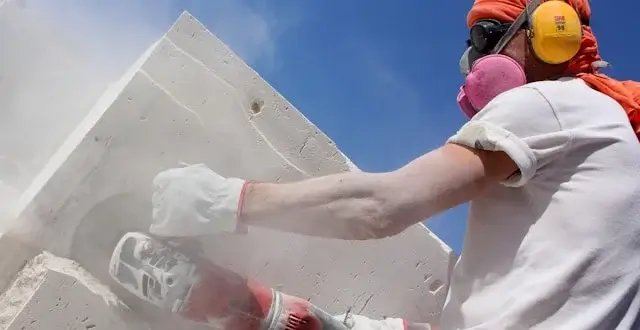Safe Work Australia ban on engineered stone
The new regulations by Safe Work Australia mark a pivotal shift in the country’s approach to occupational health and safety. From 1 July 2024, the manufacture, supply, processing, and installation of engineered stone benchtops, panels, and slabs are prohibited across Australia. This sweeping ban aims to mitigate the health risks posed by respirable crystalline silica (RCS), a byproduct of working with engineered stone that has led to numerous cases of silicosis among workers.
Why Dust Extraction is Crucial
Dust extraction isn’t merely a safety measure—it’s a lifesaving necessity. Engineered stone, commonly used in kitchen and bathroom benchtops, contains high levels of crystalline silica. When cut, ground, or polished, this material releases fine dust particles into the air. These particles are small enough to be inhaled deeply into the lungs, leading to silicosis, a serious and often fatal lung disease.
The Perils of Engineered Stone Dust
- Higher Silica Content: Engineered stone typically has a significantly higher crystalline silica content compared to natural stone, which results in a greater volume of respirable dust when processed.
- Finer Particles: The dust from engineered stone often contains nanoscale particles of crystalline silica, which are more likely to penetrate deeply into the lungs and cause severe health issues.
- Additional Toxic Components: Engineered stone dust may also include other harmful substances such as resins, metals, and pigments, which can exacerbate the toxic effects.
Key Amendments and Requirements
The amendments to the model Work Health and Safety (WHS) Regulations, effective from 1 September 2024, outline stringent controls for any permitted processing of engineered stone:
- Controlled and Notified Processing: Any processing of legacy engineered stone must be controlled, and the relevant WHS regulator must be notified beforehand.
- Risk Assessments: PCBUs (persons conducting a business or undertaking) must undertake comprehensive risk assessments for any permitted processing activities.
- Additional Duties: For high-risk work involving engineered stone, PCBUs have additional responsibilities to ensure worker safety.
Scope of the Ban
While the ban is extensive, it doesn’t apply to the processing of previously installed engineered stone for limited purposes such as removal, repair, minor modification, or disposal. Even in these scenarios, strict controls and prior notifications to WHS regulators are mandatory.
Protecting Workers: Control Measures
Implementing effective dust control measures is essential to safeguard workers from the dangers of respirable crystalline silica. These measures include:
- Wet Cutting: Using water to suppress dust at the source.
- On-Tool Dust Removal: Tools equipped with integrated dust extraction systems.
- Local Exhaust Ventilation: Capturing dust at the point of generation through specialized ventilation systems.
- Personal Protective Equipment (PPE): Providing workers with appropriate respiratory protective equipment and ensuring proper usage through training and supervision.
Worker Responsibilities and Rights
Workers play a crucial role in ensuring their own safety and the safety of those around them. Responsibilities include:
- Adhering to Safety Instructions: Following work health and safety instructions diligently.
- Using PPE Correctly: Properly using and maintaining the provided personal protective equipment.
- Raising Safety Concerns: Informing employers about any health and safety concerns and stopping work if a serious risk is identified.
Regulatory Compliance and Exemptions
The WHS regulations allow for certain exemptions from the engineered stone prohibition, provided they meet rigorous health and safety standards equivalent to those without the exemption. Applications for exemptions require consultation with Safe Work Australia’s partners and a thorough evaluation of potential risks.
Micronair’s filters provide industry leading filtration that can clean down to one micron which is 1,000th of a millimetre.
Micronair’s Custom Solutions for Compliance
Micronair, a leading dust extraction supplier, is well-equipped to support industries in meeting the updated Safe Work Australia requirements. With a strong commitment to workplace safety and innovation, Micronair offers a range of custom solutions designed to effectively manage and reduce dust exposure.
Advanced Dust Extraction Systems
Micronair’s advanced dust extraction systems are engineered to capture and filter hazardous dust at the source. These systems utilize high-efficiency particulate air (HEPA) filters and other advanced technologies to ensure that airborne contaminants are effectively removed from the workplace environment. By deploying these systems, industries can help achieve compliance and significantly reduce the risk of health issues associated with dust exposure.
The ban on engineered stone in Australia is a significant step towards protecting workers from the severe health risks associated with crystalline silica dust. Effective dust extraction, stringent controls, and comprehensive risk assessments are pivotal in ensuring worker safety. Employers and workers alike must stay informed and proactive in implementing these safety measures to prevent silicosis and other occupational diseases. You can find more information at Safe Work Australia.

